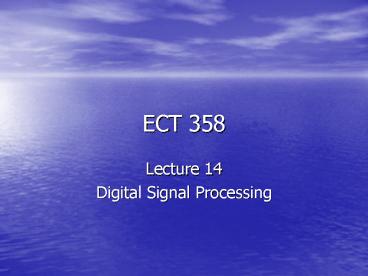ECT 358 - PowerPoint PPT Presentation
1 / 21
Title: ECT 358
1
ECT 358
- Lecture 14
- Digital Signal Processing
2
A man is rich according to what he is, not
according to what he has.
- There is that maketh himself rich, yet hath
nothing there is that maketh himself poor, yet
hath great riches. Proverbs 137
3
Signals and Sampling
- Analog Input
- Discrete Time Samples
- Manipulation of Numbers
- Mostly zero
- Has non-zero value only at the sample points
- Output at sample points approximately equals the
value of the continuous signal evaluated for the
sample point
4
Signals and Sampling
5
Discrete Linear System
- Input is convolved with another function to
produce an output
6
Generalized Discrete Linear System
7
Difference Equation
- Discrete data stream, x(n), is stored in a
shift register - Each stage of the shift register corresponds to
the delay operation - Contents of each stage multiplied by a distinct
coefficient and summed - Output is fed back through a separate shift
register with corresponding multiply and add
operations
8
Finite Impulse Response Filters
- If each of the b coefficients are zero, then
- Represents a Finite Impulse Response (FIR)
filter
9
Finite Impulse Response Filters
- Operations are delay, multiply, and accumulate
the result
10
Finite Impulse Response Filters
11
A Simple FIR Filter
- Moving Average Filter
12
Moving Average Filter Diagram
13
Eight Point Moving Average Filter
14
Eight Point Moving Average Filter
//MovAvg.v //A simple moving average filter to
illustrate FIR filter implementation //Uses an 8
point filter //Assumes 8-bit samples module
MovAvg(Y_out,temp, X_in, clk, reset) input
70 X_in input clk, reset output 70
Y_out output 100 temp reg 100 temp
reg 70 Y_out reg 70 samples06 //reg
20 k integer k
15
Eight Point Moving Average Filter
always _at_(posedge clk or posedge reset) if
(reset) begin for(k 0k lt 6k k1)
begin samplesk lt 0 Y_out lt
0 temp lt 0 end end else beg
in temp lt samples0
samples1 samples2
samples3 samples4
samples5 samples6
X_in Y_out lt tempgtgt3 for(k0 k lt
6 k k1) samplesk lt samplesk1 s
amples6 lt X_in end endmodule
16
Finite Impulse Response Filter
//rect_prototype.v //a prototype rectangular
digital filter example //fs 1000 module
rect_prototype(Y_out, X_in, clk, reset) input
clk, reset input 70 X_in output 150
Y_out reg 150 Y_out reg 150 REG
020 integer k
17
Finite Impulse Response Filter
always _at_(posedge clk or posedge reset) if
(reset) for (k 0 k lt 20 k k1) begin
REGk lt 0 Y_out lt 0 end else begin
Y_out lt (REG0 REG20) 32 //this
behavior approach to multiply causes an LPM-MULT
to be used //avoid by explicitly using power of 2
multiplies (shift) and add (REG1
REG19) 25 -(REG3 REG17)
32 -(REG4 REG16) 53 -(-REG5
REG15) 45 (REG7 REG13)
75 (REG8 REG12) 159 (REG9
REG20) 225 REG10250 for(k 0
klt20 k k1) begin REGklt
REGk1 REG20ltX_in end end endmod
ule
18
Infinite Impulse Response Filter
19
Low Pass Filter
20
Low Pass Filter Response
21
Low Pass Filter Response
//IIR_LP.v / An infinite impulse response,
digital low-pass filter based on a standard
continuous time filter formulation. / module
IIR_LP(yn, xn, clk, reset) parameter width
8 parameter order 1 /for this filter,
there is one b coefficient that has the value
0.904. We multiply by 1000 to create an integer
operation. This effectively moves the "binary"
point 10 positions to the left. In order for the
results to converge, we must compensate for this
shift in both the input and the output
data/ parameter b 10'd904 input width-10
xn input clk, reset output 2width-10
yn reg 3width0samples_out wire
3width0Data_feedforward wire 3width0
Data_feedback //input shifted 10 positions to
the left to line up with coefficient assign
Data_feedforward xnltlt10 assign Data_feedback
samples_outb //output shifted 10 positions
to the right to compensate for scale assign yn
(Data_feedforward Data_feedback)gtgt10 always
_at_(posedge clk) if (reset) samples_out lt
0 else samples_out lt (Data_feedforward
Data_feedback)gtgt10 //delayed ouput shifted 10
positions to the right to compensate for
scale endmodule































